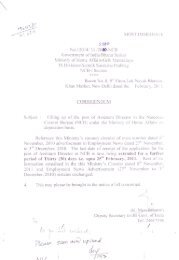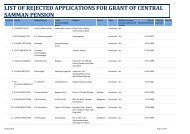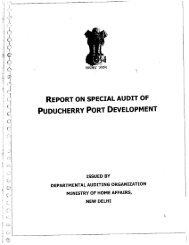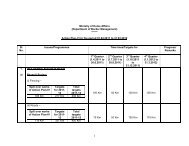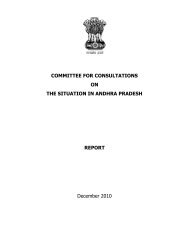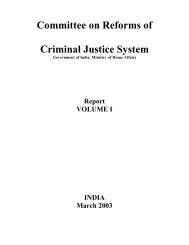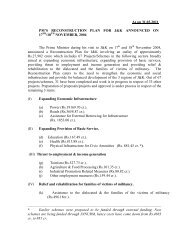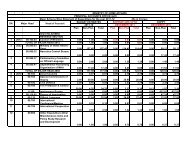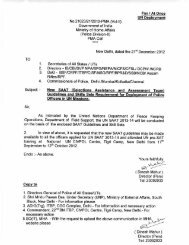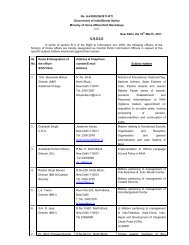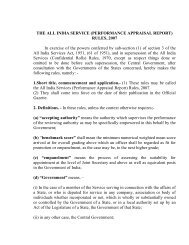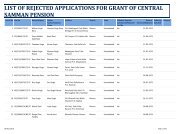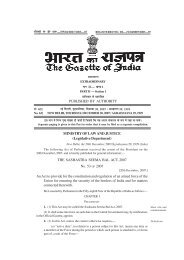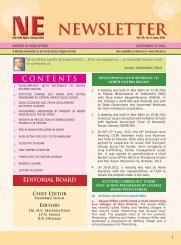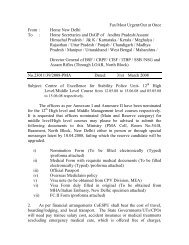Book of Integration Council New - Ministry of Home Affairs
Book of Integration Council New - Ministry of Home Affairs
Book of Integration Council New - Ministry of Home Affairs
You also want an ePaper? Increase the reach of your titles
YUMPU automatically turns print PDFs into web optimized ePapers that Google loves.
The need for the removal <strong>of</strong> regional disparities was well recognized by<br />
the leaders <strong>of</strong> independent India. The Constitution <strong>of</strong> India, has made it<br />
mandatory for the government at the Centre, to appoint a Finance Commission<br />
once at least in every five years. The Finance Commission examines the problems<br />
arising out <strong>of</strong> the gaps between the needs for expenditure and the availability<br />
<strong>of</strong> revenue and other such matters. Accordingly, the balanced regional<br />
development has become the declared goal <strong>of</strong> the Central Government and as<br />
also <strong>of</strong> the Planing Commission and the Finance Commission. This is the high<br />
time to examine the extent <strong>of</strong> success achieved in this regard.<br />
Substantial regional imbalances and disparity in terms <strong>of</strong> level <strong>of</strong><br />
development exist among the districts <strong>of</strong> Uttarakhand. These disparities can be<br />
noticed in the availability <strong>of</strong> infrastructural facilities, demographic patterns and<br />
land holding pattern <strong>of</strong> the individuals, irrigation facility and level <strong>of</strong> urbanization,<br />
large scale migrations trends in the State. I avail this opportunity to request the<br />
Central Government to extend the time limit <strong>of</strong> Industrial concessions for<br />
Uttarakhand till 2013.<br />
Private investments have a limited role to play in structural by readjustments.<br />
Therefore Central Government has to come forward to channelize investments<br />
towards poor and geographically inaccesible states. Setting up <strong>of</strong> apex<br />
educational institutions, industries and growth oriented service sectors in the<br />
poorer regions should be considered. Certain types <strong>of</strong> jobs may be <strong>of</strong>fered to<br />
the local people, even if it requires enactment <strong>of</strong> specific legislation to be<br />
made. Indicators <strong>of</strong> allocation <strong>of</strong> Central Funds to such states may be changed,<br />
at least for such time, as may bring them to a level where from they can<br />
sustain their own economic development.<br />
More than 65% <strong>of</strong> my State is covered by forests. We have very little<br />
irrigated and fertile agricultural land. We are not able to utilize and exploit our<br />
forest resources due to environmental and ecological reasons and restrictions.<br />
We have mineral resources but we can not take up its exploraton due to highly<br />
sensitive and fragile eco-system. States having less agriculture area but substantial<br />
forest cover need to be compensated accordingly. State specific subsidies should<br />
be introduced. Forest conservation Act needs to be amended to ensure greater<br />
delegation <strong>of</strong> power to the State Governments for transfer <strong>of</strong> reserve forest and<br />
other forest areas from forest to non-forest use. Civil Soyam land must as a rule<br />
be declared to be the land under the management and control <strong>of</strong> the State<br />
Government. Greater share <strong>of</strong> power to the State Governments from the power<br />
projects located within its georaphical territories is necessary to boost the<br />
180



